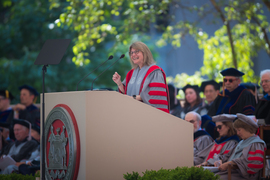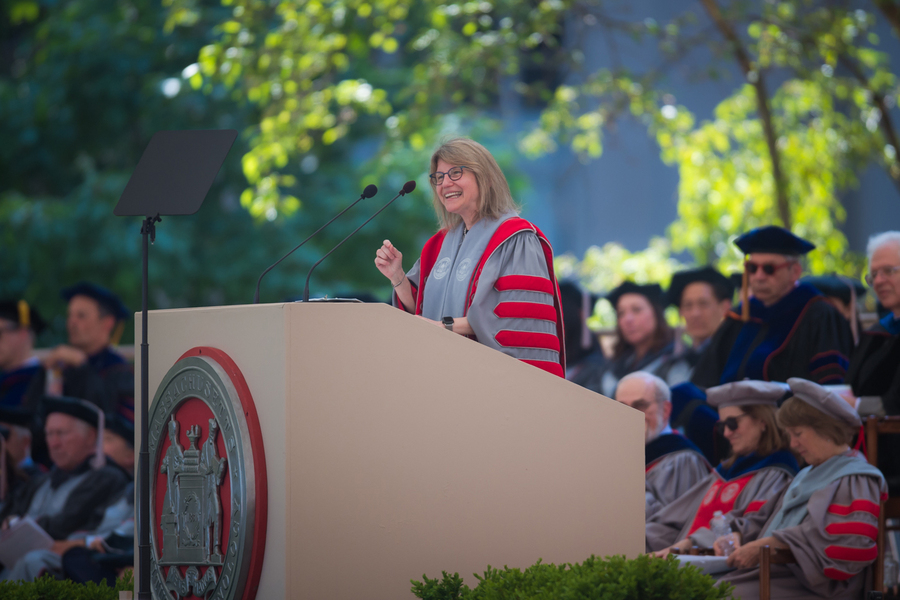Below is the text of President Sally Kornbluth’s Commencement remarks, as prepared for delivery today.
Anna, and A.J. – thank you both, for your remarks and for your leadership.
There’s an old piece of wisdom from show business: Never follow an act with kids, or animals – or, as we’ve just seen…with Mark Rober! But since A.J. and Anna rose to the challenge…I’ll give it my best shot too.
Technically, as president, it’s my role to deliver “the charge to the graduates” – and I’ll do that in a moment. But I want to begin by offering our new graduates a few words of admiration and thanks.
There are quite a few brass rats out in the world – let’s say, more than 145,000. Every one of them represents the remarkable feat of self-discipline and perseverance it takes to earn an MIT degree.
But the brass rats that were just turned by today’s graduates will always have a special luster, because all of you graduating today did more than tame your chosen discipline: You also completed an involuntary double major in Applied Pandemic Studies.
You learned and created and explored in ways no one at MIT had ever done – all while caring for your friends, your families and yourselves, through a long struggle none of us were prepared for.
I am sure we’re ALL glad to have that years-long exam behind us. But I want to acknowledge, on behalf of the faculty, that we honor all that you achieved – just like an Olympic athlete who wants to get a perfect 10 – having taken on this “added degree of difficulty”!
And what I learn from colleagues here is that you did more than hold things together for the people close to you. In an important sense, you also held together MIT. Somehow, across thousands of miles and endless hours of Zoom, you kept the culture, traditions and values of MIT alive and thriving, as if it were a precious jar of sourdough starter, passed on to the next generation.
Because of you, the Institute I’ve inherited is kinder, wiser, nimbler and more playful. You made sure that the MIT spirit – the spirit that drew you here! – would endure. And you found ways to make it even better. And for that, I cannot thank you enough.
Since I’m still a bit of a newcomer, I can deliver the probably unwelcome news that – given those Brass Rats – the world will expect a great deal from you.
I don’t even have one – yet from the minute I accepted this new position, people have been saying things to me like, “So, you folks at MIT are going to save us on climate, right? Right?” And you know, with such stellar students and faculty – and graduates – if anyone can do it, we can – and we sure are going to try!!
Of course, the world has always expected a lot from MIT graduates. (I believe our friends over there in red jackets would agree!) As ever, people will expect you to be analytical and practical and fearless and brilliant.
And now also, whatever your field (and no matter how you did on the GIRs): People will expect you to understand everything, from nuclear fusion and cryptocurrency to synthetic biology
and artificial intelligence. And to be able to explain them like an expert. And to guard us all from the attendant dangers.
To be clear: I hope, and believe, you can do all of that, and more!
But while the world (and possibly your parents…) may be expecting big things from you right away, I want to give you permission, for awhile, to not know. And to try different paths. And to change your mind. (Especially in this world with new industries, new disciplines and new jobs emerging on every frontier!)
Mark Rober described crossing the river, one wobbly stone at a time.
For me – and probably for many in the audience who are also a few decades past graduation – hearing Mark talk about changing course midstream brought a sudden memory of being metaphorically soaking wet.
Like the time that I lobbied hard to get a Vice Provost job with big new administrative duties, which I thought would be a crucial step in my career, and the university made the announcement and only then did I realize that I was wrong for the job, and it was wrong for me. And then I had to tell the president I couldn’t take it after all. (A big splash! But not the kind you want to make!)
Or even the time I had to explain to my parents that, although I’d just earned my bachelor’s in political science, the way we’d always discussed, now, I’d received a scholarship to go earn a whole new bachelor’s in biology! They weren’t unsupportive. But they were deeply puzzled; there’d never been an academic in my family.
With both of those “midstream” course-corrections, I got a little “wet” – and it was awkward at the time. But the world didn’t come to an end. And if I hadn’t changed my mind and taken an alternative route, I probably would not have found my way to this audience today.
So now, it’s time for me to deliver your charge.
I always think “charge” sounds like some kind of grand assignment, which sounds suspiciously like some massive farewell problem set.
Does that sound like a good idea?
I didn’t think so either.
So I want to give you a different kind of charge. A charge, as in a source of energy.
We’ve all seen that little warning box in the corner of the screen: “Your laptop will sleep soon if it is not plugged into a power source.” And I’m sure every student here has felt that same sensation – deep down and personally. (And often without the option to “sleep soon”!)
What’s more, even without an MIT curriculum to test our limits, we all live surrounded by devices and media and societal forces that tend to drain our batteries and dissipate our energy and attention.
Which means that, for each of us, it has never been more important to cultivate our personal sources of renewable energy.
You can name your own sources, I’m sure. But in my life – beyond the company of people I love (and those many hours spent watching British mysteries about small rural towns that have inexplicably high crime rates) – I’ve found two infinitely renewable sources of energy: Curiosity and a sense of larger purpose.
Frankly, the prominence of those two factors in the life of this community are a key part of what drew me to MIT. This place runs on curiosity! (Plus Dunkin’!) And it never runs dry!
There’s a moment I’ll never forget from graduate school that tells the same story. Some of you may have heard it, but I believe bears repeating:
We had an arrangement where each of us had a desk face-to-face with another student’s desk – but separated by a high partition. You could talk and hear across it, but you couldn’t actually see the student on the other side.
And one day, sitting at my desk, I heard a loud shout and an expletive – but in a good way, if you know what I mean – which I’m sure was accompanied by a fist pump, though I couldn’t see it.
Sitting at his computer, my fellow graduate student had been staring at the DNA sequence of the new cancer-causing gene that he’d discovered – and he suddenly realized that the missing piece of DNA sequence, which he’d thought was an artifact or an error — was actually an indication that he’d found a whole new class of cancer-causing genes.
It opened the way not only to his PhD thesis, but to his entire career. He still works on, and is considered a world’s expert in, this class of genes.
I’m sure he would tell you that it was one of the most exciting moments of his life. And the curiosity that led him there has renewed itself over and over, powering his own work, and inspiring those around him, ever since.
So, curiosity is endlessly electrifying.
And best of all is if you can find a way to harness your curiosity to a purpose larger than yourself.
One of the greatest joys in life is the feeling of using your skills to the limit, to do something important for others: your community, your discipline, your institution, your country – or even the whole human family and our fragile planet.
If you can do that, you will find a free, wireless charge wherever you go.
I wish you the warmest congratulations on all that you’ve achieved. And I cannot wait to see where your curiosity and sense of purpose lead you next!
Thank you.








